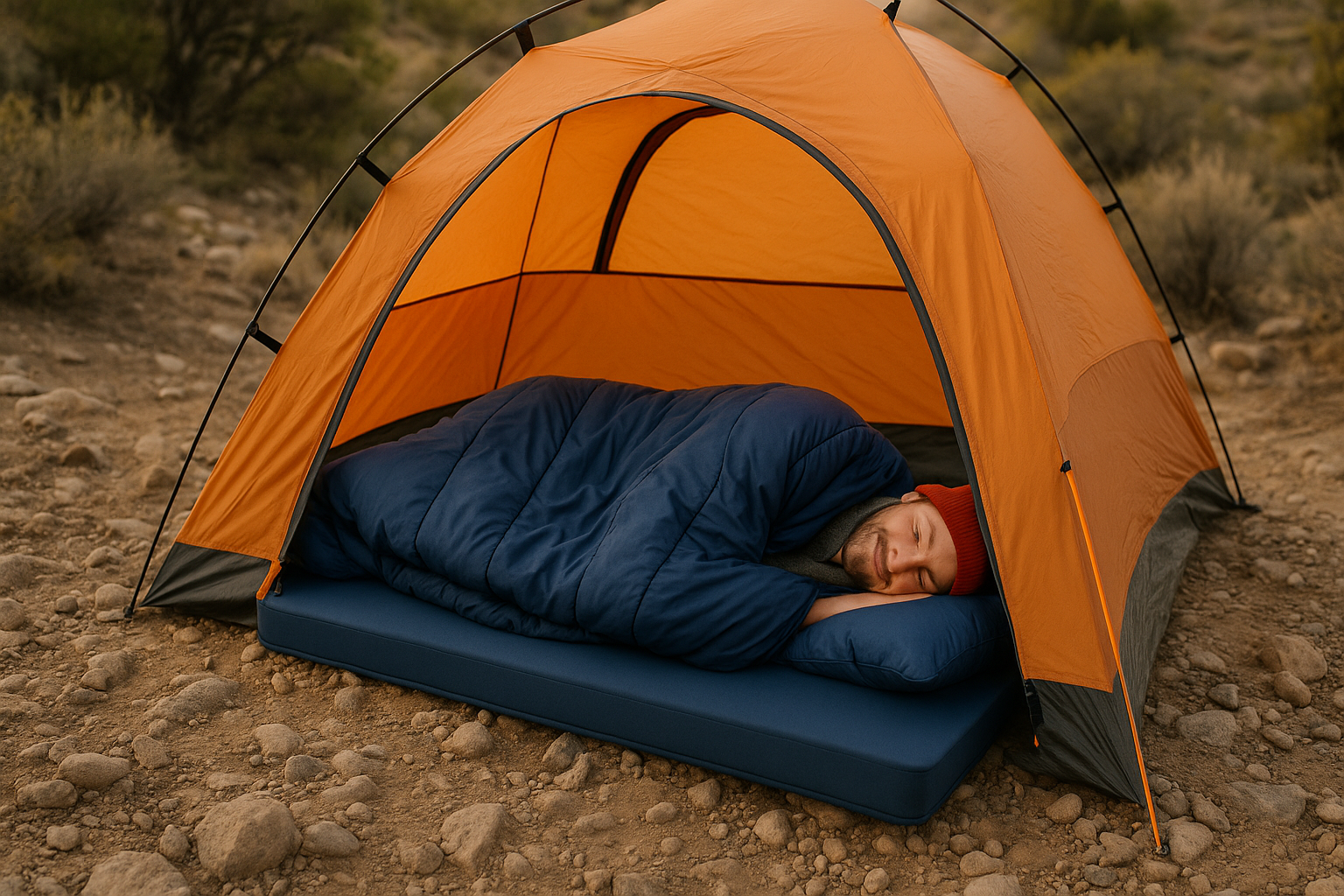You pitched your tent in the only spot available—half-covered in gravel, jutting roots poking through the soil, uneven dips where animals may have once burrowed. As night falls, your body braces for another night of tossing, turning, and regretting every inch of terrain beneath you.
But what if your camping pad could absorb the abuse instead of transferring it to your spine?
This guide is built for real campers who’ve tried sleeping on air pads that deflate, foam mats that feel like yoga mats, and budget options that compress flat after two nights. If your campgrounds are unpredictable—or always punishing—memory foam is your secret weapon. Let’s break down why, and which pads actually stand up to the wild.
Why Memory Foam Beats Air Pads and Thin Mats on Uneven Terrain
Before diving into products, let’s get clear on why memory foam is worth the extra bulk—especially on challenging ground.
1. Contour Absorption
Memory foam molds to your body, but also to the terrain. Unlike air pads that ride on top of rocks and wobble, foam fills the gaps, neutralizing pressure points beneath your hips, shoulders, and knees.
2. No Risk of Punctures
Rocky ground shreds inflatables. Even “durable” air pads fail when a sharp edge sneaks under your tent floor. Memory foam pads can be dragged over gravel without bursting. They’re battle-tested.
3. Quiet and Stable
No crinkling. No bouncing. Memory foam doesn’t shift as you move. This is crucial if you toss and turn—or are a light sleeper sharing a tent.
4. Insulation Without Inflation
Foam traps body heat and protects from cold ground temps. Air pads tend to amplify cold unless they’re insulated (and expensive). Memory foam offers all-night thermal protection—especially when temps dip.
What Makes a Memory Foam Camping Pad Great for Uneven Ground?
Not all foam is equal. Here’s what to prioritize:
| Feature | Why It Matters for Rocky Ground |
|---|---|
| High-Density Foam | Resists bottoming out over pressure points |
| Layered Construction | Combines firm base with plush top for terrain and comfort |
| Durable Cover Material | Withstands dragging over rocks, dirt, or sticks |
| Compression Straps or Buckles | Keeps roll tight for packing even if bulky |
| Non-Slip Bottom | Prevents shifting inside your tent overnight |
| Moisture Resistance | Keeps pad from soaking through when camp is damp |
Top 7 Memory Foam Camping Pads for Uneven Ground (That You Can Trust)
Here are the best memory foam camping pads for rough, uneven terrain—all verified to be available on Amazon as of this writing.
1. Willpo CertiPUR-US Memory Foam Camping Mattress
Best Overall for Rugged Terrain
- Foam Thickness: 2.75 inches
- Sizes: Twin, Single, Small
- Key Features: Waterproof cover, high-density base layer, travel bag, removable zip cover
- Weight: ~10 lbs (Twin)
Why It Rocks:
This pad is built like a portable mattress. Campers love it for uneven forest floors and gravel parking lots. The double-layer foam system offers body-conforming support with enough structure to mask out jagged terrain.
Bonus: Rolls tight with compression straps and includes a carrying case.
2. Hazli Memory Foam Roll-Up Camping Mattress
Best for Van Life & SUV Camping (Also Works Great on the Ground)
- Foam Thickness: 3 inches
- Sizes: Kids, Single, Twin
- Key Features: Water-resistant cover, non-slip bottom, carry bag, CertiPUR-US foam
- Weight: ~12 lbs (Twin)
Why It Rocks:
Designed for car camping but tough enough for rocky terrain, the Hazli mattress has a waterproof cover that resists abrasion and dampness. Great for campgrounds with no flat spots in sight.
Pro Tip: Toss it directly over truck bed liner or tent floor—this pad absorbs punishment like a champ.
3. Zermätte Roll-Up Memory Foam Sleeping Pad
Most Luxurious Option for Hardcore Glampers
- Foam Thickness: 3 inches
- Sizes: Single, Twin
- Key Features: Plush velour top, waterproof bottom, gel-infused cooling memory foam, travel bag
- Weight: ~13 lbs
Why It Rocks:
This one’s for campers who refuse to compromise. With gel memory foam and a soft touch surface, Zermätte delivers spa-level sleep even when camped on rubble.
Field Report: “Slept like I was in my own bed—even though my tent was pitched on literal gravel.”
4. Milliard Tri-Folding Memory Foam Mattress Pad
Best Folding Foam Pad for Car Campers and Overlanders
- Foam Thickness: 4 inches
- Sizes: Cot, Twin, Full
- Key Features: Tri-fold design, removable cover, CertiPUR-US foam
- Weight: ~13–18 lbs
Why It Rocks:
This isn’t your backpacking pad—it’s a folding sleep fortress. But if you’re car camping, overlanding, or setting up on rough forest service roads, this is your go-to.
Heads up: Too bulky for hiking, but unbeatable for stationary basecamp comfort.
5. Wellax UltraThick FlexFoam Sleeping Pad
Hybrid Pick: Memory Foam + Self-Inflating Core
- Foam Thickness: 3 inches
- Weight: ~6 lbs
- Key Features: Self-inflating core + foam, compact roll-up, waterproof cover
Why It Rocks:
Combines the cushion of memory foam with the structure of a self-inflating core. While not pure foam, it delivers incredible support on uneven surfaces without going full inflatable.
Bonus: Packs smaller than others on this list—ideal for those who want compromise between bulk and back-friendliness.
6. REVALCAMP Memory Foam Sleeping Pad
Best Budget Pick for Rough Ground
- Foam Thickness: 2 inches
- Weight: ~5 lbs
- Key Features: Compact roll, water-resistant, comes in bright colors
Why It Rocks:
If you’re tight on budget but still want foam comfort, REVALCAMP delivers. Surprisingly supportive for the price, though thinner than other options.
Not ideal for big bodies or freezing temps, but great for summer and moderate surfaces.
7. Better Habitat SleepReady Portable Floor Mattress
Best for Injury Recovery or Camping With Joint Issues
- Foam Thickness: 3 inches
- Weight: ~17 lbs
- Key Features: Durable water-resistant cover, orthopedic memory foam, roll-up design, non-slip bottom
Why It Rocks:
SleepReady is popular among campers with back pain, joint issues, or recovering from injury. Built like a home mattress, it’s shockingly effective on the roughest surfaces. Pricey, yes—but worth it if your spine is yelling at you.
Pro Packing Tips for Bulky Foam Pads
Let’s be real: memory foam pads don’t pack small. Here’s how to deal:
- Use roof racks or truck beds when car camping
- Strap to external backpack frame (if hiking short distance only)
- Pair with compression bags or military-style cinch straps
- Consider duffel bags with external webbing loops for tie-down
Also, bring a ground tarp or footprint to protect the foam from wetness and reduce mud build-up.
What About Backpacking?
Memory foam camping pads are not ideal for ultralight backpacking. They’re bulkier and heavier than inflatable options. But if:
- You’re hiking less than 2 miles
- You’re base camping for days
- You prioritize sleep comfort over weight
…then hauling a foam pad is absolutely worth it.
If you must go lighter but still want terrain insulation, consider hybrid pads (like Wellax) or closed-cell foam with a thin memory foam topper.
Why Not Just Use a Cot?
Cots elevate you, sure—but they’re not terrain-proof either:
- Rocky ground can cause unstable footing
- Cots don’t insulate from cold air under the frame
- Bulky to transport, especially for one-person setup
A solid memory foam pad on uneven ground beats a shaky cot setup any day—especially in wind or sloped terrain.
Conclusion: Choose Foam When the Ground Won’t Cooperate
Air mattresses pop. Thin pads flatten. But dense memory foam? It adapts. When you’re camped on rough terrain, roots, gravel, or slope, these pads buffer the world so you can actually sleep. Not just survive.
🔑 Final Recommendations:
- For Overall Comfort: Willpo or Zermätte
- For Portability & Versatility: Wellax Hybrid
- For Budget Camping: REVALCAMP
- For Car Camping or Injury Recovery: Milliard or Better Habitat
If the ground under your tent feels like punishment, stop suffering. Get the foam that fights back.

